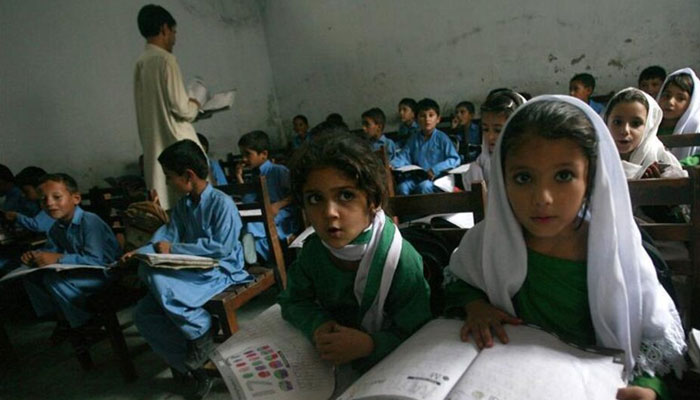Role of NGOs and international organisations in enhancing literacy in Pakistan
Education plays a pivotal role in the amelioration of socio-economic conditions of a society. It not only accelerates societal progress but also builds capacity and elevate the community to the next level.
Despite significant efforts by the state, the most recent UNICEF report reveals that Pakistan has the world's second-highest number of out-of-school children (OOSC). An estimated 22.8 million children aged 5-16 years are not attending school, representing 44 percent of the total population in this age group.
The political and economic instability of Pakistan is a major obstacle to implementing reforms and developing the educational sector. The politically and economically challenged society requires significant measures to overcome the dire state of educational conditions.
In such challenging conditions, NGOs and international organisations (IOs) are actively addressing the educational crisis and devising solutions to mitigate the harmful effects of illiteracy. In Pakistan, these IOs and NGOs are providing substantial support to education by initiating programs focused on quality education, community engagement, skill development, advocacy, and the supply of instructional and material resources. They are also involved in training teachers and instructors. These organisations are not only striving to upgrade the standard of education but are also significantly influencing educational policies. They offer recommendations, provide normative guidance, and establish networks with like-minded institutions.
Numerous NGOs are working to improve education in Pakistan, including The Citizens Foundation, Akhuwat Foundation, Idara-e-Taleem-o-Aagahi, Zindagi Trust, HOPE, RB Welfare Organisation, The Noor Project, and Indus Resource Center. For example, The Citizens Foundation (TCF) operates over 1,800 schools, providing education to nearly 280,000 students in rural areas and urban slums across Pakistan. TCF not only delivers quality education but also offers scholarships to its alumni. The NGO also collaborates with other organisations to provide vocational training, supporting students in their educational pursuits and assisting them in securing jobs within the same school network.
Alongside NGOs, international organisations are also playing a significant role in advancing education in Pakistan. The Japan International Cooperation Agency (JICA) provides funding for educational initiatives, while the Australian Agency for International Development (AusAID), Canadian International Development Agency (CIDA), United Nations Children's Fund (UNICEF), United Nations Educational, Scientific and Cultural Organisation (UNESCO), World Bank, and USAID all are involved in various aspects of educational development, including teacher training and curriculum development. Additionally, the European Union and the Asian Development Bank offer loans and grants to support educational reforms.
“Room to Read” is a global organisation based in San Francisco that contributes to educational initiatives across Asia and Africa. With a mission to create a world free from illiteracy, the organisation helps students in underprivileged communities develop literacy skills and cultivate a positive reading habit. It focuses on creating libraries and collaborates with various organisations and publishing houses to publish books.
Public-private partnerships and collaborations are also yielding positive outcomes. One notable example is the “Ilm Ideas 2” program, implemented between 2015 and 2020 as a collaboration between the UK's Department for International Development and Pakistan's federal government. This program focused on professional training, resource equipment, expertise sharing, and curriculum development. The results were highly beneficial, addressing various educational issues and paving the way for sustainable approaches in the education sector.
Similarly, The Citizens Foundation (TCF) is collaborating with the public sector on joint initiatives aimed at improving educational infrastructure, enacting policy reforms, and expanding access to underprivileged areas and economically disadvantaged communities in Pakistan.
Precisely, both international organisations (IOs) and NGOs are at the forefront of advancing education in Pakistan. They are leading the way with innovative education programs and engaging communities at various levels to ensure access to quality education for all. Additionally, they provide essential resources for further development in the education sector.
While NGOs and IOs play a positive role in education, they can also have some negative impacts as well. Over-reliance on NGO aid may result in diminished government responsibility for ensuring quality education. Additionally, NGOs may impose their own agendas and cultural values, potentially disrupting local education systems. Some NGOs may focus exclusively on specific communities, inadvertently marginalizing others. A lack of accountability can lead to negative outcomes and unsustainable initiatives.
Collectively, NGOs and IOs are playing an instrumental role in Pakistan's education landscape by offering assistance in various areas. Their impact could be further enhanced by operating transparently, aligning with local needs, and actively involving local communities without marginalising any group. To ensure quality education and skill development, it's imperative to take appropriate steps in the future, maintaining neutrality and avoiding alignment with specific agendas. Providing transparent evidence of funding sources will bolster trust among the populace, reassuring them that these organisations are committed to addressing educational challenges effectively and will help them enhance their literacy while keeping the programs in complete conformity to their local traditions and customs.
-
 Japan Unveils Anti-ship Missile With ‘barrel-roll’ Evasion To Outsmart Defenses
Japan Unveils Anti-ship Missile With ‘barrel-roll’ Evasion To Outsmart Defenses -
 How Brooklyn Beckham 'mentor' Prince Harry Inspiring Him To Speak Against Family?
How Brooklyn Beckham 'mentor' Prince Harry Inspiring Him To Speak Against Family? -
 Zac Efron, Kenny Ortega Revisit 'High School Musical' After 2 Decades
Zac Efron, Kenny Ortega Revisit 'High School Musical' After 2 Decades -
 Threads Overtakes X On Mobile Users: Here’s Why Everyone’s Switching
Threads Overtakes X On Mobile Users: Here’s Why Everyone’s Switching -
 Kanye West Eyes Performing First-ever Concert In India
Kanye West Eyes Performing First-ever Concert In India -
 Brooklyn Beckham's Claim About Nicola's Wedding Ordeal Gets Challenged
Brooklyn Beckham's Claim About Nicola's Wedding Ordeal Gets Challenged -
 AI Horror: 4 In 5 Young Workers Fear 'AI Could Replace Their Jobs', Says Report
AI Horror: 4 In 5 Young Workers Fear 'AI Could Replace Their Jobs', Says Report -
 Missouri Couple ‘locked Sons In Chicken Pen, Shot Them’ In Shocking Abuse Case
Missouri Couple ‘locked Sons In Chicken Pen, Shot Them’ In Shocking Abuse Case -
 King Charles Receives 'delightful' Royal Baby News
King Charles Receives 'delightful' Royal Baby News -
 Chinese ‘mega Embassy’ Wins UK Approval In London Ahead Of Starmer’s China Visit
Chinese ‘mega Embassy’ Wins UK Approval In London Ahead Of Starmer’s China Visit -
 David Beckham Gives Telling Reaction To Brooklyn’s Public Complaints
David Beckham Gives Telling Reaction To Brooklyn’s Public Complaints -
 Can Ibuprofen Cut Cancer Risks? Study Finds Promising Breakthrough
Can Ibuprofen Cut Cancer Risks? Study Finds Promising Breakthrough -
 Piers Morgan Finally Reacts To Brooklyn Beckham's Statement About David And Victoria Beckham
Piers Morgan Finally Reacts To Brooklyn Beckham's Statement About David And Victoria Beckham -
 Tom Hiddleston Reveals Unlikely DC Character That Inspired Loki
Tom Hiddleston Reveals Unlikely DC Character That Inspired Loki -
 Prince Harry, Meghan Markle Warned 2026 Will Be 'a Big Test' For Them
Prince Harry, Meghan Markle Warned 2026 Will Be 'a Big Test' For Them -
 OpenAI Plans First ChatGPT Device For 2026
OpenAI Plans First ChatGPT Device For 2026




